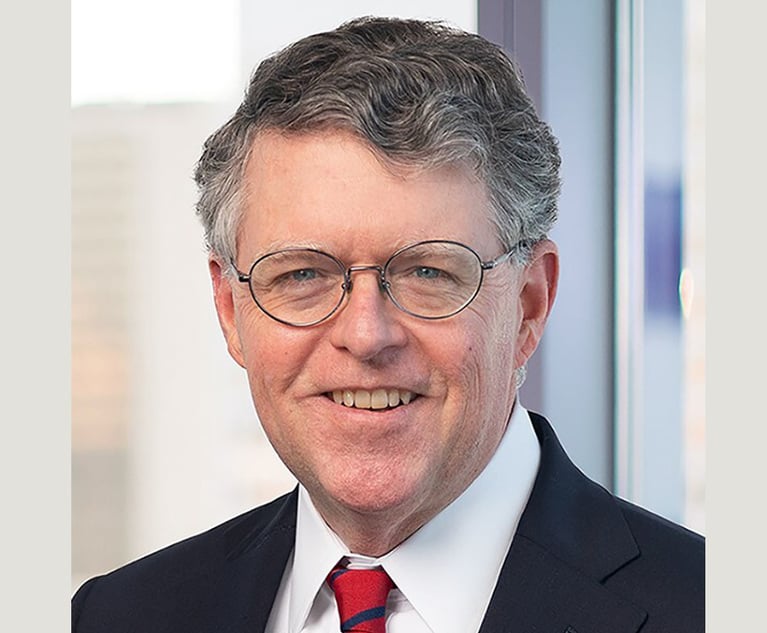How to Prepare for Investigations Yet to Come in the Wake of the COVID-19 Pandemic
Once the immediate danger presented by COVID-19 has passed, congressional scrutiny and investigations can be expected to follow suit.
March 27, 2020 at 07:59 PM
6 minute read

In Washington, D.C., the current focus is on containment of the novel coronavirus, treatment of the sick, and helping individuals and businesses that have suffered financially. But as Congress has now passed the Coronavirus Aid, Relief and Economic Security Act, the largest stimulus effort in U.S. history, for in-house counsel charged with anticipating future legal challenges, it is worth pausing to consider what is to come once the virus is contained and the country begins to recover from the crisis. Using past precedent as a guide, we can be certain that the CARES Act will spark significant congressional investigations and oversight, which will likely play out through a number of channels.
In the wake of national disasters and crises, and the attendant deployment of federal resources, congressional oversight and investigations have followed. These investigations have typically focused on issues of waste, fraud and abuse, especially when significant dollars are involved. Given that the current $2.2 trillion stimulus package more than doubles the stimulus following the 2008 financial crisis, we can expect a robust investigative landscape that will be active for years to come. This oversight will sweep across industries and may include those receiving stimulus dollars, as well as those in the health care and related industries involved in the response to COVID-19.
Looking back to the 2008 financial crisis, we can identify some common threads that are likely to emerge. In the years following the financial crisis and the implementation of government stimulus laws, multiple committees in both the U.S. House and Senate claimed jurisdiction and convened dozens of oversight hearings focused on those industries that received funding or were perceived to have benefited from those laws. Beyond asking whether the programs that Congress authorized in the wake of a crisis were appropriate and effective, the issues likely to draw scrutiny from Congress are similar to those that arose during the 2008 financial crisis: executive compensation, bonuses and employee wage issues; stock buybacks; corporate spending on retreats and other "nonessential" items; pricing changes in the wake of the disaster, including gouging; whether a company had taken appropriate financial or management steps preceding the crisis and "deserved" the aid; diversity and inclusion considerations; and contacts with the presidential administration, including whether political influence was brought to bear to receive funding or assistance.
This scrutiny will not be limited to congressional committees alone. Following the 2008 financial crisis, Congress created numerous oversight bodies to examine the very assistance programs and funding they authorized. This included a Congressional Oversight Panel to review the Treasury Department's implementation of stimulus measures and the state of the financial markets. The Congressional Oversight Panel most resembles the Congressional Oversight Commission created by CARES, which will be responsible for examining the Treasury Department's management of the loan programs, investments and other spending to stabilize the economy after COVID-19.
In addition to House and Senate committee hearings and the work of congressionally appointed panels, audits and investigations by inspectors general will be a significant part of CARES oversight as they have following prior stimulus efforts. CARES authorizes a Special Inspector General for Pandemic Recovery to examine the loans and loan guarantees awarded by the Secretary of the Treasury. Separately, CARES establishes additional responsibilities for inspectors general through the creation of a Pandemic Response Accountability Committee, which is charged with overseeing all funds made available to non-federal entities for coronavirus response. With the past as a guide, the oversight conducted and reports issued by the inspectors general can both prompt and bolster the oversight conducted by congressional committees.
In addition to these oversight mechanisms included in the CARES Act itself, additional investigative entities may be stood up down the road. The Financial Crisis Inquiry Commission (FCIC), a quasi-legislative independent commission established in 2009 to "examine the causes, domestic and global, of the current financial and economic crisis in the United States" provides a particularly apt case study. The FCIC was provided with subpoena authority to compel documents and testimony, and from May 2009 through their submission of a final report in January 2011, the FCIC compiled an extensive investigative record, including obtaining millions of pages of documents, interviewing more than 700 witnesses and holding 19 days of public hearings. Such quasi-legislative independent commissions have been increasingly common since the turn of the century, with the establishment of the 9/11 Commission, the FCIC and the Wartime Contracting Commission, and it is something that could likely emerge in the COVID-19 context.
Given the heightened investigative activity that is certain to come from Congress as well as from the other corners of the government, companies and their counsel would be well served to consider this reality as they determine how to use any funding or assistance they receive through CARES and as they communicate with executive branch agencies. In addition, companies and their counsel must recognize that congressional investigations and any other such inquiries will be conducted against the backdrop of likely overlapping civil, regulatory and potentially criminal proceedings. It will be important to appreciate this landscape, and the reality that materials produced in one context may have relevance in another parallel matter. Congress' institutional position that it does not recognize the attorney-client privilege only underscores how important and complex these considerations are.
Once the immediate danger presented by COVID-19 has passed and the country shifts into post-crisis mode, it's important to recognize that scrutiny and investigations are likely to be a significant part of the aftermath. Recognizing this reality will allow companies receiving funding or assistance from federal stimulus programs to make better-informed decisions now and pave the way for more favorable outcomes in future investigations.
Michael Fires contributed to this column.
Rafi Prober, Karen Christian and Steven Ross are partners, and Michael Fires is an associate, in the congressional investigations practice at Akin Gump Strauss Hauer & Feld. Prober is a former DOJ associate deputy attorney general, Christian is former general counsel of the House energy and commerce committee, and Ross is former general counsel of the U.S. House of Representatives.
This content has been archived. It is available through our partners, LexisNexis® and Bloomberg Law.
To view this content, please continue to their sites.
Not a Lexis Subscriber?
Subscribe Now
Not a Bloomberg Law Subscriber?
Subscribe Now
NOT FOR REPRINT
© 2025 ALM Global, LLC, All Rights Reserved. Request academic re-use from www.copyright.com. All other uses, submit a request to [email protected]. For more information visit Asset & Logo Licensing.
You Might Like
View All
The Marble Palace Blog: Supreme Court Books You Should Read in 2025

Switching Positions: US Solicitors General and Climate Change Lawsuits
6 minute readLaw Firms Mentioned
Trending Stories
- 1More Litigation Coming? Insulin MDL Gets Boost from FTC Report
- 2Judge Spends 3 Hours Explaining His Decision
- 3Morgan Lewis Closes Shenzhen Office Less Than 2 Years After Launch
- 4On The Move: Freeman Mathis & Gary Adds Florida Partners, Employment Pro Joins Jackson Lewis
- 5New Trouble for Allstate: National Class Action Targets Insurer
Who Got The Work
J. Brugh Lower of Gibbons has entered an appearance for industrial equipment supplier Devco Corporation in a pending trademark infringement lawsuit. The suit, accusing the defendant of selling knock-off Graco products, was filed Dec. 18 in New Jersey District Court by Rivkin Radler on behalf of Graco Inc. and Graco Minnesota. The case, assigned to U.S. District Judge Zahid N. Quraishi, is 3:24-cv-11294, Graco Inc. et al v. Devco Corporation.
Who Got The Work
Rebecca Maller-Stein and Kent A. Yalowitz of Arnold & Porter Kaye Scholer have entered their appearances for Hanaco Venture Capital and its executives, Lior Prosor and David Frankel, in a pending securities lawsuit. The action, filed on Dec. 24 in New York Southern District Court by Zell, Aron & Co. on behalf of Goldeneye Advisors, accuses the defendants of negligently and fraudulently managing the plaintiff's $1 million investment. The case, assigned to U.S. District Judge Vernon S. Broderick, is 1:24-cv-09918, Goldeneye Advisors, LLC v. Hanaco Venture Capital, Ltd. et al.
Who Got The Work
Attorneys from A&O Shearman has stepped in as defense counsel for Toronto-Dominion Bank and other defendants in a pending securities class action. The suit, filed Dec. 11 in New York Southern District Court by Bleichmar Fonti & Auld, accuses the defendants of concealing the bank's 'pervasive' deficiencies in regards to its compliance with the Bank Secrecy Act and the quality of its anti-money laundering controls. The case, assigned to U.S. District Judge Arun Subramanian, is 1:24-cv-09445, Gonzalez v. The Toronto-Dominion Bank et al.
Who Got The Work
Crown Castle International, a Pennsylvania company providing shared communications infrastructure, has turned to Luke D. Wolf of Gordon Rees Scully Mansukhani to fend off a pending breach-of-contract lawsuit. The court action, filed Nov. 25 in Michigan Eastern District Court by Hooper Hathaway PC on behalf of The Town Residences LLC, accuses Crown Castle of failing to transfer approximately $30,000 in utility payments from T-Mobile in breach of a roof-top lease and assignment agreement. The case, assigned to U.S. District Judge Susan K. Declercq, is 2:24-cv-13131, The Town Residences LLC v. T-Mobile US, Inc. et al.
Who Got The Work
Wilfred P. Coronato and Daniel M. Schwartz of McCarter & English have stepped in as defense counsel to Electrolux Home Products Inc. in a pending product liability lawsuit. The court action, filed Nov. 26 in New York Eastern District Court by Poulos Lopiccolo PC and Nagel Rice LLP on behalf of David Stern, alleges that the defendant's refrigerators’ drawers and shelving repeatedly break and fall apart within months after purchase. The case, assigned to U.S. District Judge Joan M. Azrack, is 2:24-cv-08204, Stern v. Electrolux Home Products, Inc.
Featured Firms
Law Offices of Gary Martin Hays & Associates, P.C.
(470) 294-1674
Law Offices of Mark E. Salomone
(857) 444-6468
Smith & Hassler
(713) 739-1250












